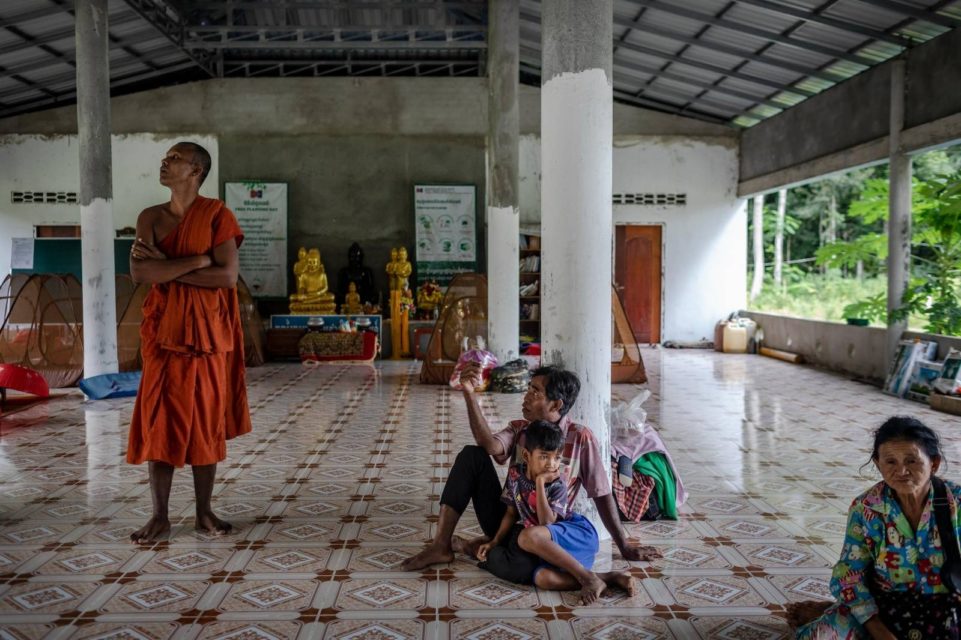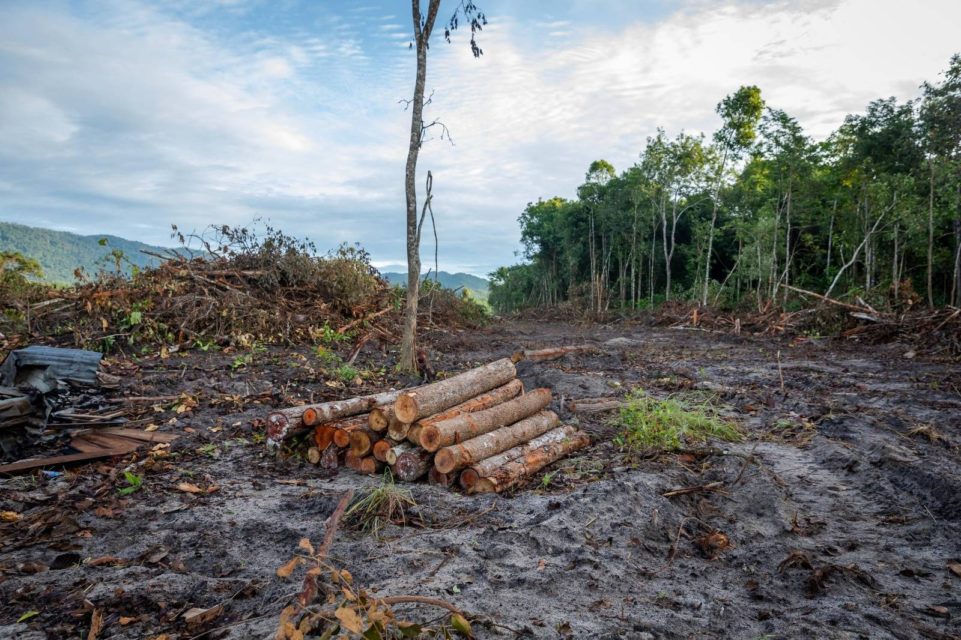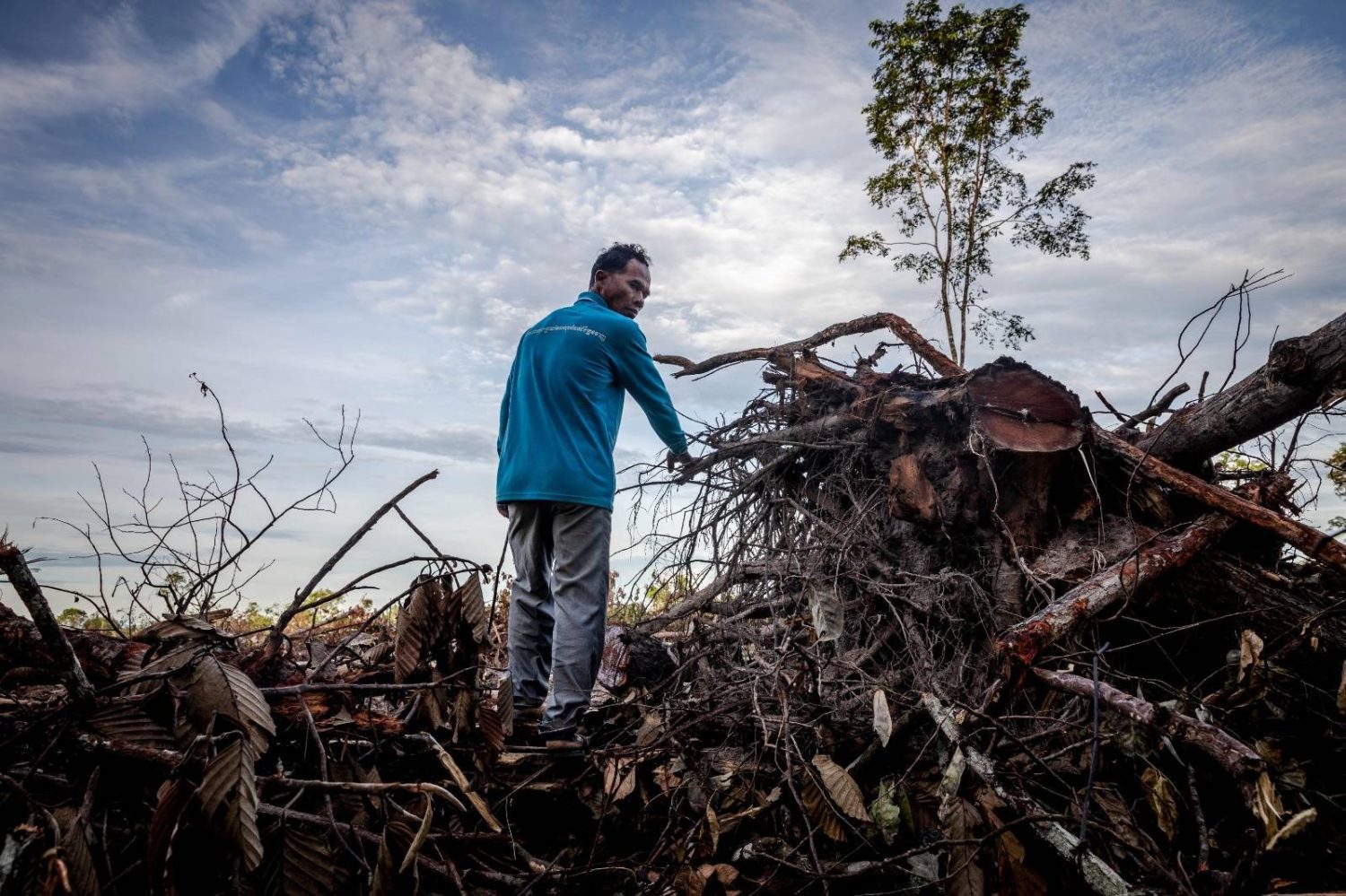About 5 km by dirt road from the roundabout of Trapeang Cho commune is the gated entrance to the Metta forest.
Driving into the forest toward its small pagoda, a visitor sees several signs hung along the road: “Drop the weapon, take the dharma,” reads one.
In the past four months, since the last visit of VOD reporters in February, the sound of birdsong and other animals seems to have faded.
The forest itself has dramatically shrunk, cut back in a swift march by workers overseen by soldiers of the Brigade 70 infantry unit. Though cutting has been ongoing since last year, the past two months have marked a rapid escalation in clearing activity, as seen in satellite imagery.
On Tuesday, an older man wearing black pants and a white shirt quickly stood up and smiled after seeing reporters arrive at his home in Pourmeas village, just outside the forested area.
Soy Sat, 71, was one of four people charged in the Kampong Speu Provincial Court in 2021 after protesting the actions of the brigade, which villagers say has devastated their community.
“They have new guns that should be used to protect the country from the enemy, but instead [are used] to threaten and shoot at the people,” Sat said, trying to speak louder than the noise of saws in the forest.
Metta forest, which translates to “loving kindness,” is part of the Phnom Oral Wildlife Sanctuary and was largely given away by sub-decree last year to dozens of veterans from the military’s tank unit. Members of Brigade 70 have been spotted at various times overseeing the clearing of the forest. Locals say they have been attacked and beaten by the troops, who have fired warning shots with live ammunition.
The brigade was formerly tasked with guarding Prime Minister Hun Sen and is now described as an elite infantry unit. Rights observers have implicated the group in numerous abuses across the country.
Sat added that in the past month, the army has overseen work crews and 30 small tractors, known as koyun, as they haul cut timber past his house. These crews have passed every day for the past week, and continue to clear more land, day and night. Their cutting has nearly reached the pagoda in the center of the forest, home to the Venerable Prom Thomacheat, a monk who lives in a state of hermitage.
In the process of this clearing, Sat added, soldiers burned a small wooden house where Thomacheat used to sleep. He also claimed they destroyed seven Buddha statues on Sunday — the same day as the commune elections.
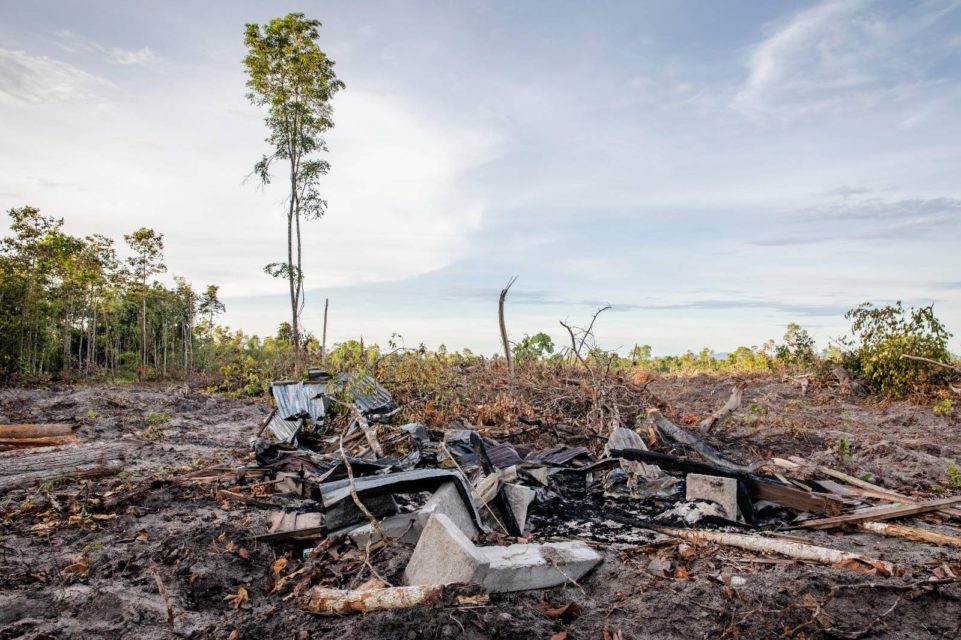
Sat believed that part of the reason for the increased number of loggers is recruitment by a local environmental official he identified only as Chak.
According to Sat, this official collected money for the transport of wood, charging the loggers about 50,000 riel, about $12.5, for a load of wood to make charcoal. Sak said the cost to remove logs of luxury wood, including padauk, is about $100.
Sat also said the community has continued to protest the clearing and patrol the forest. However, he thought this direct action seemed ineffective, while the soldiers were becoming increasingly violent. Troops had threatened villagers and stolen five mobile phones from them during encounters, he said.
However, the villagers are still advocating for nonviolent actions to demand a stop to the clearing, through petitions and patrols.
Sat was adamant that he would continue this, speaking in a clear, steady voice.
“I will not stop until my death is over,” he said.
He continued that the community has no other agenda but to continue protecting the forest they have overseen for about 20 years. The villagers have allowed their cattle to graze in the woodlands, and have extracted nontimber forest products such as mushrooms, vegetables and wild fruits. The forest was also a site for domestic tourism and meditation, with Cambodian travelers stopping by Thomacheat’s pagoda on visits to Phnom Oral.
Sat added that a few months ago, the village chief negotiated the boundary to the cutting to sit about 500 meters from the pagoda. However, Sat continued, the soldiers broke their promise to stop cutting, instead continuing to encroach up to about 200 meters from the pagoda.
At the same time, though the sub-decree stated the government would give the land to soldiers for settlement, Sat claimed they were not using it to farm or build houses. Instead, he continued, they cut down the forest to sell the wood before selling the land itself to others, including tycoons, whom the community has heard will mine the earth.
Numerous sand pits already dot the landscape outside the former boundaries of the forest. Heavily loaded sand trucks rumble down local roads at regular intervals.
VOD reporters walked just about 100 meters from the pagoda and saw a dead woodland with toppled trees. Some of those had fallen into two water pools built for the wildlife of the forest. Seven Buddha statues had also been destroyed in the area.
After feeding the animals as part of his usual routine, the monk Thomacheat told VOD that he does not believe the law can protect natural resources like the Metta forest. In both the past and the present, he continued, unknown men have violently attacked him. Soldiers also stole his phone about a month ago to prevent him from taking photos of their activity, Thomacheat said.
He explained that the incident made him realize the rest of the forest depended on moral leaders. Meanwhile, he said, immoral leaders have never helped to protect them.
“Forests are left [alone] every day because of morality,” he said. “If only protected by the law, I have no faith in this.”
He said a high level of the forest’s wildlife had already been killed. Only 10 monkeys and more than 20 wild chickens escaped to come to the pagoda, which was their sanctuary. Thomacheat said he did not trust the soldiers to stop clearing the forest, because the boundaries they set were constantly changing.
The peace and tranquility of the forest had once attracted visitors from across the country. Kim Bunra, 61, is one of Cambodia’s unofficial nuns, women who devote themselves to Buddhism by studying the dharma and serving the clergy.
Bunra lives in Siem Reap, but had planned to stay at Thomacheat’s simple pagoda for three months to meditate in the forest.
She said she loves wildlife and practicing her faith in what had been a quiet place. Now, she is disappointed and remorseful that the soldiers continue to destroy the forest. Bunra said the area is very different from how it had been five months ago, the last time she and her peers had come.
“I came here because I love nature, love quiet places, [where it is] easy to practice, but did not expect it to be destroyed like this,” she said. “I shed tears when I saw [the forest] being demolished, I do not know how to explain my feelings now.”
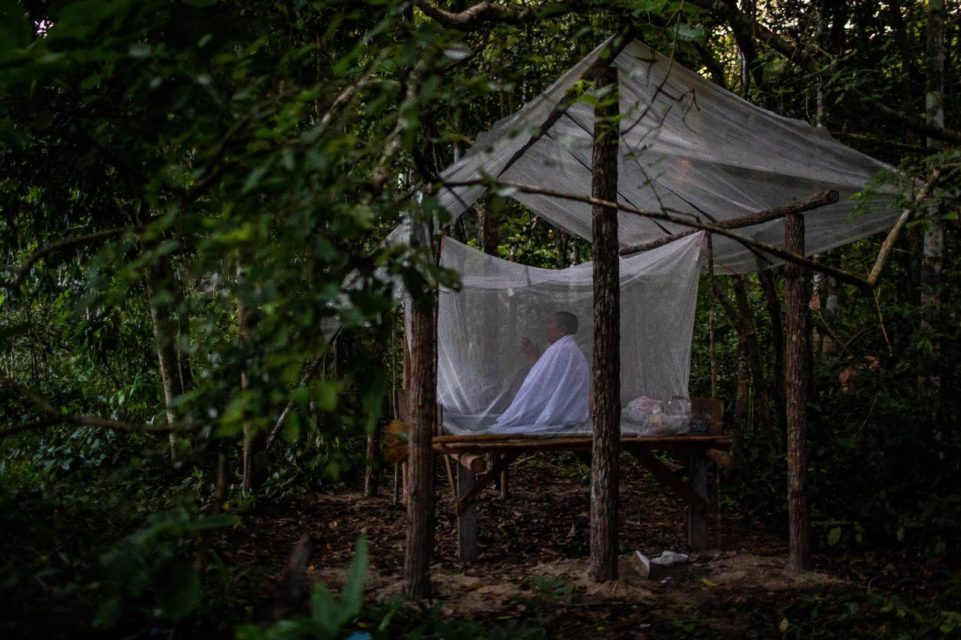
Because of the clearing, Bunra will cut her stay short and return to Siem Reap on Friday, after just about 10 days at the pagoda. She said she heard gunshots every night in the forest.
A local infantry commander who refused to give his name to VOD said he was unaware of the destruction of the Buddha statues and the burning of the monk’s home. The commander said the clearing of the forest was being carried out by each military family listed in the sub-decree, as he did not order it.
He said that the boundaries to the clearing had already been measured by the Environment Ministry, while the military only followed the law. However, he did not know the exact boundaries, referring the question to the director of the Kampong Speu provincial environment department.
Nou Nak, the deputy director of the department, said he was investigating the case and could not comment.
“I have not been able to explain anything yet, I just researched the complaints of the people,” Nak said.
